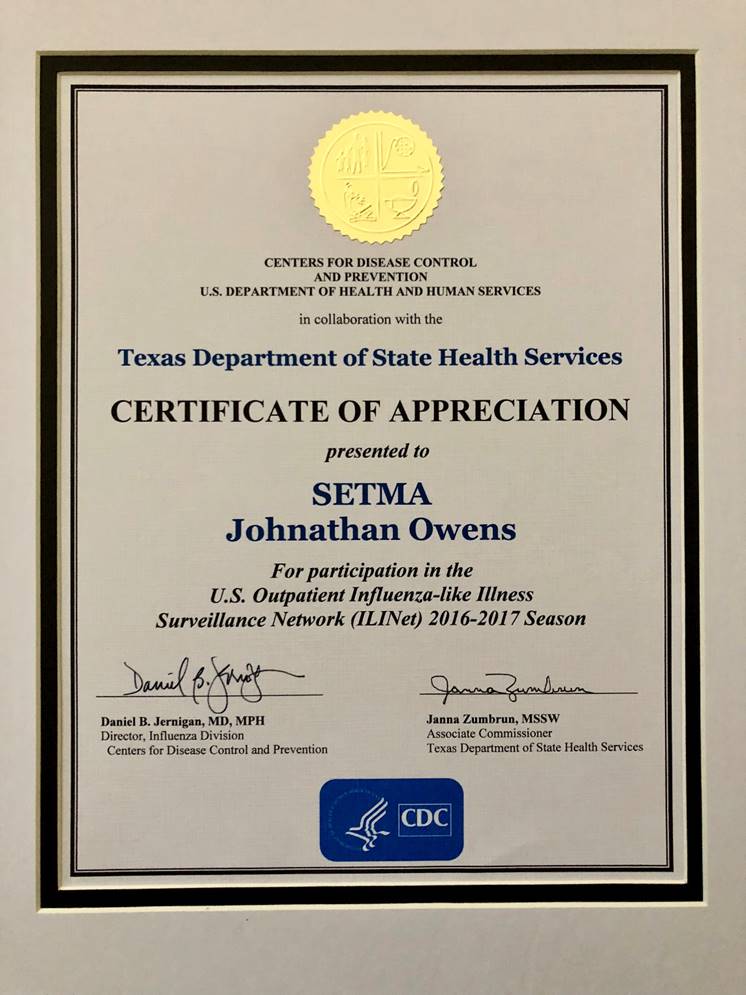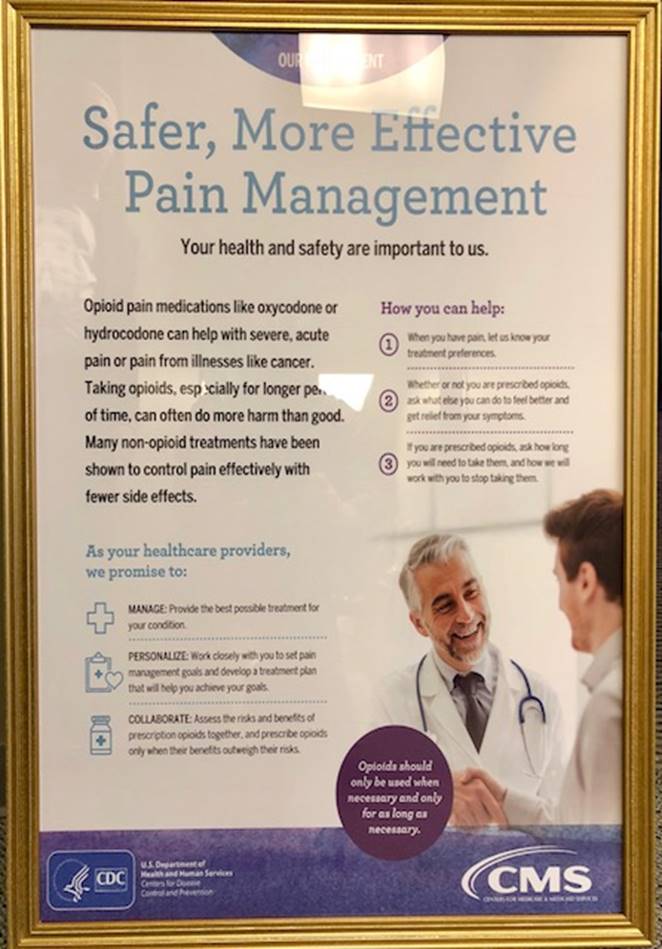|
On May 9, 2018, Sherry Ulmer, RN, Public Health Director of the City of Beaumont Health Department and Darrell Irvin, Epidemiologist for the City of Beaumont Health Department presented SETMA with a certificate of appreciation from the Centers for Disease Control in Atlanta, Georgia, and the Texas Department of Health in Austin and the Beaumont Department of Public Health. Mrs. Ulmer and Mr. Irvin personally presented Mr. Johnathan Owens, SETMA’s Chief Information Officer, Mrs. Patricia Crawford, SETMA’s Director of Care Coordination and Dr. James L. Holly, SETMA’s CEO, with Certificates of Appreciation from the CDC for SETMA’s continued participation in this valuable reporting.
The following explanation accompanied the presentation
SETMA has been voluntarily tracking and reporting the number of patients seen in SETMA’s six clinics with symptoms of Influenza-like Illnesses along with the number of patients showing positive test results for Influenza A and Influenza B since 2013.
SETMA was asked to become a part of the Influenza-like Illness Surveillance Network (ILINet) due to SETMA’s regular reporting of infectious diseases to Darrell Irvin, Epidemiologist with the City of Beaumont Health Department.
The symptoms of an Influenza-like Illness are fever of 100 or above along with a cough and/or sore throat without a known cause other than Influenza. The fever has to be documented as taken in the office or self-reported by the patient. The number of patient visits with Influenza-like Illnesses are reported by age group, and clinic location. Included in the reporting is the total number of patients seen in each clinic.
In 2013, Jonathan Owens developed a report within SETMA’s electronic system to automatically track the number of patients with symptoms of an Influenza-like Illness. These reports are sent weekly to Robert Russin with the Texas Department of Health and Human Services and the Centers for Disease Control and Prevention (CDC).
Influenza viruses are constantly evolving and cause thousands of hospitalizations and deaths nationwide yearly. The data reported by medical providers participating in the Influenza-like Illness Surveillance Network is important for monitoring the impact of influenza which in turn guides prevention and control activities, the vaccine strain selection and patient care.
In a recent email from Robert Russin, State ILINet (Outpatient Influenza-Like Illness Surveillance Network) Coordinator with the Texas Department of State Health Services (DSHS) SETMA received the following information. SETMA’s clinics are the only ILINet participants between Houston and Lafayette.
SETMA started sending the CDC reports 7/12/2013 and has provided ILINet reports on a year round basis ever since. Because SETMA provides year round reporting, the Health Department can see flu activity that may be occurring before the regular season begins in October.
That is very important. Not many participants in the ILINet Program do year round reporting. The significance of SETMA’s reports to the CDC in indicated that about 5% of the data that the Health Department and the CDC have for the current flu season for Texas came from SETMA Clinics. The Department most definitely appreciates what SETMA is doing for Flu Surveillance in Texas.

Left to Right: Dr. Holly, Mrs. Ulmer, Mrs. Crawford, Mr. Owens, Mr. Irvin

(note: Mr. Owens first name is misspelled on the certificate)
A similar framed certificate was presented to Mrs. Crawford, to Dr. Holly and to all SETMA providers. These framed certificates are being proudly displayed in all six SETMA clinics.
History of SETMA’s Work with Public Health – SETMA’s Philosophy
How can healthcare providers design a solution to a complex healthcare problem, particularly when the problem is not generated by a patient's request but by a public-health need? In the former case, the provider simply determines if the request is appropriate or not. In the latter case, no one is in the provider's office requesting a service; a requirement has been established and it is up to the provider, in the midst of many other demands, to remember and to fulfill the requirement. In the case of infectious diseases, requirements have been published for providers to report the occurrence of dozens of conditions.
The problem is that the medical literature is filled with studies showing very low compliance of physicians with reporting infectious diseases to State Health Departments. In Texas, there are 78 infectious diseases which require reporting. The window for reporting compliantly varies from immediately, to one working day, to one week, to ten days, to one month. It is improbable that many healthcare providers know the entire list or the requirement for reporting. The Department of Health wants the report to be triggered by a suspicion and not by a confirmed diagnosis. If the provider waits until the confirmation is made, the opportunity for a public health intervention is lost. A systems solution would be best. The ideal solution would be an electronic medication record (EMR) system in which the reporting action is triggered by the documentation of the diagnoses in the assessment in the EMR.
Reportable Conditions
The Texas Department of Health requires physicians to report the occurrence of 78 illness to the Department. On April 30, 2011, Dr. Holly made a presentation for a CME program at Texas A&M College of Medicine. The lecturer who followed him was Dr. Edward J. Sherwood, who lectured on "The Ethics of Infectious Disease." During his presentation, Dr. Sherwood distributed a publication of the Texas State Health Department which detailed the 78 reportable conditions. During this presentation, it occurred to Dr. Holly that rather than asking provider to memorize a list of 78 infectious diseases and to organize them into groups according to the time frame in which reporting is required, that the EMR is an ideal means of doing this reporting electronically.
Therefore, he asked SETMA’s CIO to automate this reporting so that when a diagnosis was made by a SETMA provider, a note would be automatically sent to the Care Coordination Department which would then make the report to the Health Department. In 2012, Dr. Holly made a presentation to the Massachusetts Medical Society in which this function was a key element that can be reviewed at: Process Analysis and How Many Tasks Can You Get A Provider to Perform at Each Encounter?. This made it possible for SETMA to report all infectious disease occurrence with 100% accuracy.
HIV Screening
In the summer of 2011, Ms. Isabel Clark, MA, RD, who led the DSHS HIV/STD Prevention and Care Branch invited SETMA to participate in a CDC-sponsored HIV Screening program. The principle behind this program was that the majority of new HIV cases resulted from contact with someone who did not know that they were HIV positive. Screening all patients between 13 and 64, most persons who were unknown to be HIV positive could be identified thus stopping the spread of HIV.
The trigger for the ordering of HIV screening was automated and the incidence of testing was audited to assure compliance by all SETMA providers. SETMA’s work included the presentation of our screening program to state-wide 2013 meetings in Austin and San Antonio sponsored by Test Texas HIV Coalition.
Ebola Outbreak
In 2014, an outbreak of Ebola in the United States was feared. SETMA immediately deployed an alert in our EMR which made certain that all patients at risk were identified, that accurate information was made available and that public health education was promoted and provided by SETMA. The following link gives the details of our work in regard to Ebola: SETMA: Ebola, EMR Herd Immunity and Ethics. SETMA also participated in public health meetings planned by the Beaumont Health Department.
Electronic Prescribing of Controlled Substances and Opioids
In 2015, SETMA expanded its electronic prescribing of medications to include the electronic prescribing of controlled substances (ePCS). In 2015, SETMA was invited to participate on a planning committee for the promotion of ePCS by the Texas State Medicaid- CHIP Health Information Technology Health and Human Services Commission: see ePCS and High Intensity Drug Trafficking Areas (HIDTA) Program. By August, 2015, all SETMA providers were prescribing opioids and controlled substances electronically. This capability included the ability for each provider to self-audit their prescribing of these medications.
When the CDC published its principles for primary care provider use of opioids (see: http://www.healio.com/family-medicine/pain-management/news/online/%7B859b632c-0ee2-484b-a786-97f39698dc55%7D/cdc-releases-opioid-prescription-guidelines-for-primary-care-physicians), SETMA reviewed those principles and reviewed them with all of SETMA providers. The twelve principles are:
- Opioids are not the first-line therapy, and should only be used when the benefits outweigh the risks;
- Establish goals for pain and function;
- Discuss risks and benefits with patients;
- Use immediate-release opioids, rather than extended-release, when starting;
- Use the lowest effective dosage;
- Prescribe shorter durations for acute pain;
- Frequently evaluate benefits and harms;
- Use strategies to mitigate risk;
- Review patients’ Prescription Drug Monitoring Program data;
- Use urine drug testing before starting opioid therapy;
- Avoid prescribing concurrent opioid and benzodiazepine treatments; and
- Offer treatment for opioid use disorder.
SETMA has dramatically changed our use of these medication due to ePCS, this review and the following poster program.
CDC Opioid Poster Program
In 2009, SETMA began electronically prescribing all medications and began electronic prescribing of opioids in July, 2015. In January, 2018, SETMA received a letter from Robert Flemming, PhD, MHA, MBADirector, Transforming Clinical Practice Initiative Centers for Medicare & Medicaid Services which stated: “Dear Transforming Clinical Practice Initiative Clinician:
“The Centers for Medicare & Medicaid Services is pleased to include your practice in the Opioid Safety Commitment Poster Program. As a participant in the Transforming Clinical Practice Initiative (TCPI), we are grateful for your commitment to providing patient-centered pain management based on the best existing evidence. We believe that participating in this program will foster open conversation about pain management strategies that will improve the care of your patients.
“As a TCPI practice, you can help the fight against the prescription opioid epidemic by placing the enclosed opioid safety posters in your waiting and examination rooms. We believe these posters will help your patients understand your commitment to their pain management needs and also your practice's patient safety principles.”

This framed poster is displayed in all six SETMA waiting rooms and in six other public places.
SETMA is proud of the certificates which we have received from the CDC, the Texas State Health Department and the Beaumont Public Health Department. We look forward to continue working with these organizations to improve the health of all citizens and residents of the United States of America.
|